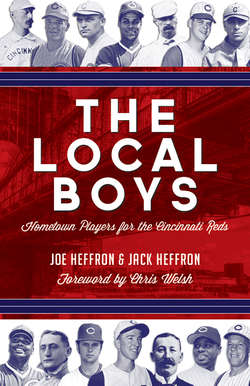Читать книгу The Local Boys - Joe Heffron - Страница 25
На сайте Литреса книга снята с продажи.
JIM BROSNAN
ОглавлениеOCTOBER 24, 1929–
Major League Career
1954 – 1963
Time as a Red
1959 – 1963
Position
PITCHER
WHILE GROWING UP IN WESTWOOD, Jim Brosnan nurtured dreams of playing major league baseball and writing books. By the age of 30, he’d done both. Though he had a solid nine-year career in the big leagues, he’s best remembered for his classic books: The Long Season, about his travails in 1959, when he was traded to the Reds from the Cardinals, and Pennant Race, about the Reds’ 1961 National League championship season.
He presented a much more candid look at the lives of ballplayers than fans had seen before. At the time, books by ballplayers were ghostwritten, whitewashed tales that perpetuated the wholesome myths of The National Pastime, but Brosnan’s laconic wit and wry irreverence tipped a few sacred cows. In his introduction to a new edition of The Long Season, he comments, “I had violated the idolatrous image of big leaguers who had been previously portrayed as models of modesty, loyalty, and sobriety.” Wearing glasses and sporting a quirky, scholarly air, he was known among teammates as “Professor.”
He first drew attention from major league scouts while pitching for Elder High School and for the Bentley Post American Legion team that made it to the national finals in 1946, in part due to shutouts Brosnan threw in the sectional and regional finals. Future major league player and manager Don Zimmer and future major league manager Jim Frey also played on that team. Somehow the Cubs beat the Reds to signing Brosnan. Maybe the Reds had heard he was not your typical prospect.
The Cubs certainly learned that during his early years in the minors, one manager reporting to the parent club that Brosnan was a “lone wolf,” given to reading magazines in the dugout during games. He was drafted into the Army in 1951 during the Korean War but remained stateside. While at Ft. Meade in Maryland, he met Ann Stewart and they married, settling in Chicago and raising three children.
After struggling in 1954 for the Cubs, he came back in 1956 and performed well as both a starter and reliever for the next few years, earning an opening day start in 1958. Still, management felt that he wasn’t living up to his potential, that his eccentric nature undermined his competitive spirit. The Cubs traded him to St. Louis, where he also was seen as a player with too much intellect for his own good.
The Reds traded for him in 1959, but Brosnan says he didn’t feel sentimental about returning to his hometown. “I didn’t like it to start with because I was happy in St. Louis,” he says. “But it was a big break for me in the end because I got to play in a World Series.” While he admits to the boyhood dream of pitching in the majors, he adds “it didn’t matter which team.” As for donning the hometown colors, that didn’t mean much either: “By that time I had been in baseball for 10 years,” he says. “The uniforms all fit about the same way.”
He had his best years in Cincinnati, primarily as a reliever. Success in 1959 led to starting opening day in 1960, though he lasted just an inning and two-thirds, giving up four runs on four hits and walking three. With his usual candor, he says, “I don’t really remember much about it. I only remember that I was lousy.”
He ended up enjoying another strong season, and in 1961 he and Bill Henry gave the Reds a powerful bullpen tandem that helped win the pennant. In 80 innings, he posted a 10–4 record with 16 saves and a 3.04 ERA. He was nearly as good the following year, but after a slow start in 1963, the Reds traded him to the White Sox, who told him to stop writing. He refused. By then his articles were appearing in Sports Illustrated and other magazines, so he ended his baseball career. After retiring, he worked for a Chicago advertising agency and later in broadcasting. He continued to write, frequently for Boys Life. He still lives in Chicago and remains as irreverent as ever.
